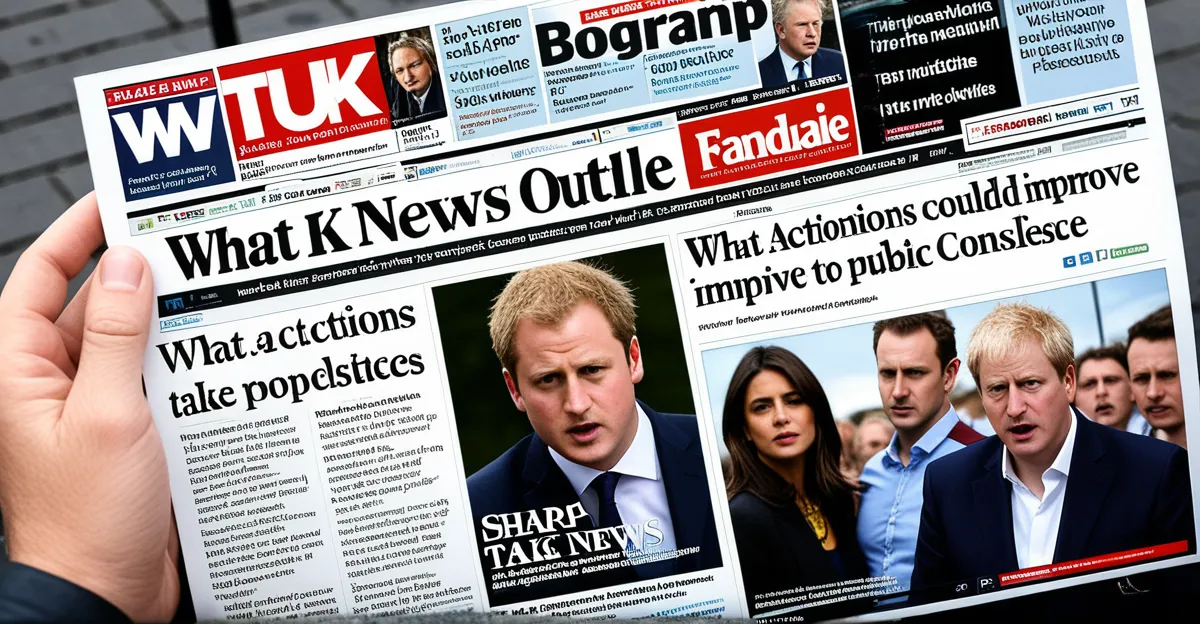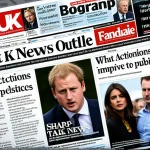Key Actions to Improve Transparency in UK News Media
Transparency in journalism plays a crucial role in fostering public trust and enhancing the credibility of news organisations. To improve UK media openness, news outlets must prioritize clear communication about their editorial decisions and journalistic processes. This means providing audiences with detailed explanations of how stories are selected, verified, and presented, which demystifies newsroom operations and strengthens audience confidence.
One core aspect of transparent reporting is the disclosure of sources, where feasible, to underline the reliability of information. Additionally, openly addressing corrections when errors occur further demonstrates accountability and commitment to accuracy. Funding influences, including sponsorships and ownership structures, should also be transparently disclosed, as this guards against perceived or actual conflicts of interest that can erode trust.
Also to read : How to set up your own home nas in simple steps
Several UK and international news outlets have pioneered transparency initiatives worth noting. For example, some newspapers publish regular transparency reports detailing editorial decisions and corrections. Such models serve as practical examples for other UK media organisations aiming to bolster their transparency. Embracing these approaches ensures audiences feel informed not only about the news but about the integrity of its reporting process itself.
Strengthening Accuracy and Rigorous Fact-Checking
Accurate reporting hinges on thorough fact-checking processes that uphold high journalistic standards. UK media organisations must implement robust verification methods before any story reaches publication to ensure news accuracy. This starts with detailed cross-checking of sources, dates, and factual claims. Errors or exaggerations not only misinform audiences but also diminish trust in the media.
Also read : What Are the Imminent Challenges Facing the UK in Today’s Global Landscape?
Many leading outlets now employ dedicated fact-checking teams tasked specifically with vetting information. These specialised units collaborate closely with reporters and editors to filter out inaccuracies and highlight any ambiguities requiring further investigation. Collaborative initiatives between news organisations and independent fact-checkers also enhance the depth and impartiality of the verification process.
Successful models underscore best practices, such as openly publishing fact-checking criteria and methods. For example, certain UK and international outlets provide transparent correction logs and clearly explain how disputed information is resolved. These efforts advance news accuracy by demonstrating commitment to precision and ethical rigor. By embracing such comprehensive fact-checking frameworks, UK media can significantly improve the reliability of information presented to the public, reinforcing confidence in journalism overall.
Promoting Balanced and Impartial Reporting
Achieving balanced reporting is essential for sustaining impartial journalism that audiences can trust. This requires news organisations to actively represent diverse viewpoints within their coverage. Balanced reporting goes beyond equal time allocation; it involves thoughtful inclusion of varied social, political, and cultural perspectives to provide a comprehensive understanding of issues.
Editorial guidelines play a pivotal role in fostering unbiased news by setting clear standards that avoid favouring particular interests or narratives. Such policies help journalists navigate complex stories while maintaining neutrality. Newsrooms committed to impartial journalism often conduct regular training and reviews to ensure these guidelines are consistently applied.
A comparative analysis of policies across leading UK and international media reveals that transparency about editorial decisions supports unbiased news. Outlets with explicit commitments to impartiality tend to publish explanations about how they balance coverage or address controversial topics. These transparency measures reinforce audience confidence by demonstrating a conscious effort to uphold fairness and limit bias.
Overall, balanced reporting is not merely a goal but an ongoing practice demanding vigilance and institutional support. By prioritising diverse perspectives and robust editorial rules, UK media can strengthen impartial journalism and deliver news that reflects a broad spectrum of society.
Enhancing Accountability and Clear Editorial Policies
Enhancing editorial accountability is vital for reinforcing media accountability and restoring public trust in UK news media. A critical step involves creating transparent complaint and correction procedures that allow audiences to raise concerns and receive timely, clear responses. Transparent processes for handling mistakes demonstrate a newsroom’s commitment to responsibility and accuracy, essential pillars of trustworthy journalism.
Publishing comprehensive editorial policies further strengthens accountability by outlining standards journalists must follow. These codes of conduct specify expectations regarding impartiality, fact verification, and conflict of interest management. Making such policies publicly available invites scrutiny and shows that media organisations uphold rigorous standards consistently.
Several UK outlets have instituted third-party oversight mechanisms, including press regulators and independent ombudsmen, to maintain checks on editorial decisions. These initiatives provide an external layer of accountability, ensuring that complaints are addressed impartially and transparently. Emulating these models can help news organisations build robust, trusted editorial frameworks, fostering greater confidence in their reporting integrity.
Increasing Audience Engagement and Responsive Journalism
Enhancing audience engagement is critical to cultivating public trust in news and ensuring media remains responsive to its consumers’ needs. One effective approach is fostering two-way communication between news organisations and their audiences. This strategy moves beyond traditional one-way reporting, enabling active dialogue where readers can share feedback, ask questions, and feel heard.
Implementing public feedback systems creates structured pathways for audience input. These systems often include comment sections, social media interactions, and dedicated platforms for submitting concerns or story ideas. By systematically collecting and addressing feedback, UK media outlets show commitment to transparency and responsiveness, which reinforces trust.
Moreover, involving readers directly in editorial processes can enhance inclusion and fairness. Some organisations invite audience participation in story selection or focus groups to understand public interests better. This co-creation model strengthens the bond between media and communities by making journalism more relevant and accountable.
Engagement tools also provide valuable insights that help editors refine content, align coverage with audience priorities, and detect misinformation. Thus, adopting comprehensive audience engagement practices not only improves responsiveness but also supports greater public trust in news, ultimately enhancing the democratic role of UK media.
Embracing Ethical Journalism and Professional Development
Maintaining ethical journalism is fundamental to strengthening media trust-building within the UK news landscape. Journalists and editors must engage in regular journalistic ethics training to stay updated on evolving professional standards and reinforce their commitment to integrity. These training sessions often cover sensitive topics such as managing conflicts of interest, respecting privacy, and handling sensitive information responsibly. Through education, newsrooms cultivate a culture that prioritises honesty and accountability.
Adopting and publicly sharing comprehensive ethical frameworks further supports transparency and accountability. When media organisations openly communicate their ethical standards, they invite public scrutiny and demonstrate dedication to principled reporting. These frameworks guide reporters in navigating complex editorial choices, ensuring that decisions align with core values like fairness and respect.
The impact of consistently applied ethical journalism extends beyond internal newsroom culture, directly influencing media trust-building among audiences. Transparent adherence to ethical principles reassures the public that news is reported with care and respect for accuracy. In turn, this fosters greater credibility and strengthens the relationship between UK media outlets and their communities.
By investing in ongoing professional development and ethical standards, UK news organisations not only enhance journalistic quality but also contribute to a more trustworthy and reliable news environment.
Key Actions to Improve Transparency in UK News Media
Transparency in journalism demands clear communication regarding editorial decisions and everyday journalistic processes. UK media openness hinges on news organisations providing detailed insights into how stories are selected, verified, and crafted. This clarity helps audiences understand the rigorous work behind the news and reduces skepticism about hidden agendas.
Central to transparent reporting is the disclosure of sources wherever possible, which bolsters the trustworthiness of the information presented. When sources cannot be revealed for valid reasons, explaining these restrictions further maintains openness. Equally important is the proactive admission and correction of errors, demonstrating accountability and a commitment to accuracy. Openly sharing funding influences, including sponsorships and ownership, guards against conflicts of interest that may undermine credibility.
Several UK and international outlets offer valuable case studies illustrating transparency initiatives. For example, some have established regular transparency reports revealing editorial workflows and mistake rectifications publicly. These practices set benchmarks for other organisations aspiring to enhance their openness. Overall, prioritising transparent reporting strengthens UK media openness by building a direct relationship of trust and understanding between newsrooms and their audiences.







